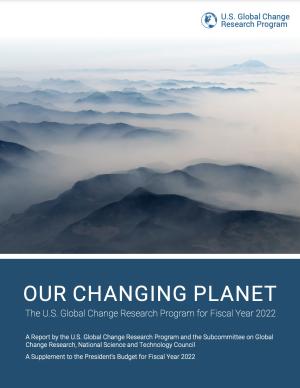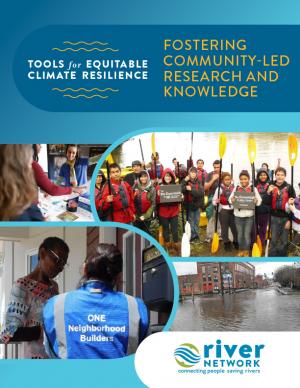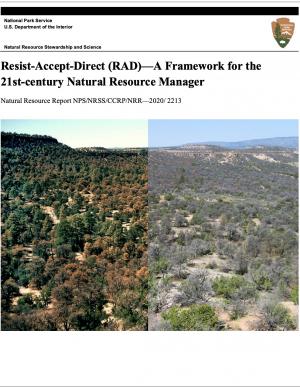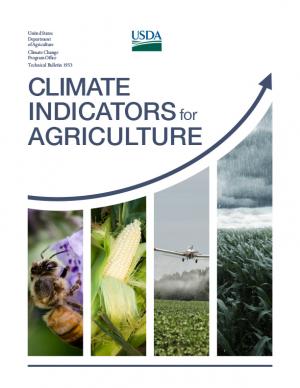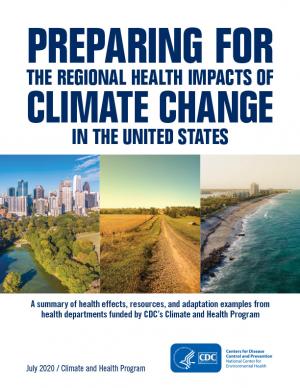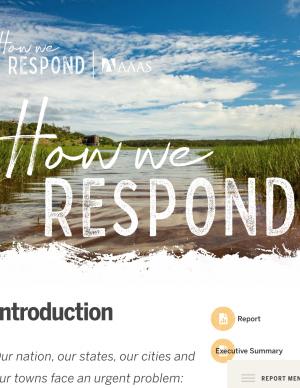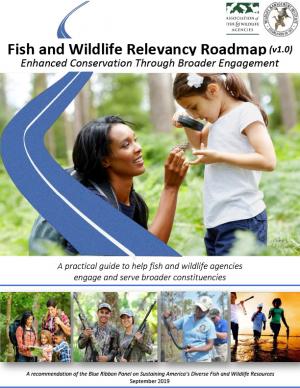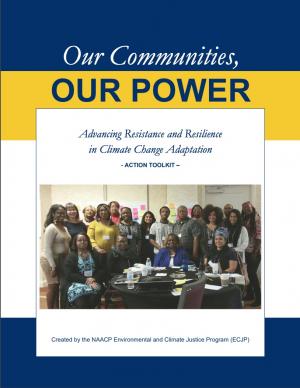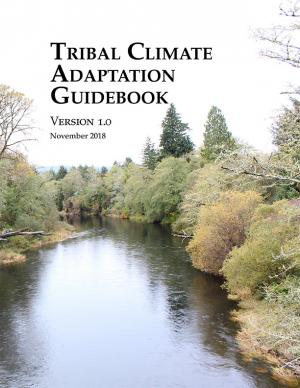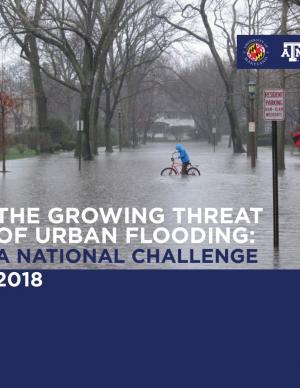Access a range of climate-related reports issued by government agencies and scientific organizations. Browse the reports listed below, or filter by scope, content, or focus in the boxes above. To expand your results, click the Clear Filters link.
The Fiscal Year 2022 edition of the U.S. Global Change Research Program (USGCRP’) annual report to Congress, Our Changing Planet, presents recent Program accomplishments that illustrate how USGCRP is meeting its mandate under the GCRA and achieving the goals outlined in the Program’s 2012–2021 Strategic Plan and its 2017 update. Highlighted activities represent interagency collaborations undertaken in calendar year 2020 that rely on coordinated investments of two or more member agencies and contribute to implementing USGCRP’s strategic goals.
The central recommendation of this report, submitted to the National Climate Task Force, is that the pursuit of a decade-long national conservation effort be faithful to eight core principles. These principles—which include a commitment to collaboration, support for voluntary and locally led conservation, and honoring of Tribal sovereignty and private property rights—are essential ingredients to building and maintaining broad support, enthusiasm, and trust for this effort. These principles are also indispensable to achieving durable outcomes that meaningfully improve the lives of Americans.
This report provides step-by-step guidance and lessons learned on how to effectively engage with community members to understand climate impacts and to develop more equitable climate resilience strategies. Community-based organizations have repeatedly emphasized that to equitably and successfully carry out climate resilience solutions, it’s imperative to directly engage with community members to deeply understand how these threats directly impact them. Likewise, to formulate solutions that are equitable and truly work—and to get utilities and city officials to prioritize equitable investments in under-invested areas—organizations must directly engage with members of the community when identifying solutions. The toolkit provides real-world case studies, a project planning and facilitation guide, and extensive lists of references and resources.
This report aims to build the capacity of organizations to serve as catalysts in supporting members of their communities stepping into leadership roles, as well as engaging them meaningfully in defining the scope of local climate change risks and impacts and formulating and implementing equitable solutions alongside key partners. This guide was developed using qualitative data collected through a series of interviews with experts from around the country who are designing, managing, and implementing community-based leadership development programs. Although not all of these programs directly address climate change and environmental justice, this collection of diverse programming illustrates the broad ways in which communities address leadership development and grassroots engagement in local decision making. This tool provides a comprehensive picture of training and capacity-building theory and practice, and showcases programs that are diverse in content, audience, geography, outcome, and practice.
The National Park Service and other federal land management agency partners offer Resist-Accept-Direct (RAD)—A Decision Framework for the 21st-century Natural Resource Manager. The report presents and explores a simple set of distinct management options that decision makers can consider when responding to ecosystems facing the potential for rapid, irreversible ecological change. In so doing, the report provides a framework that encourages natural resource managers to consider strategic, forward-looking actions, rather than structure management goals based on past conditions.
This report provides national, regional, and local information to support effective decision making by U.S. agricultural producers, resource managers, and other agricultural system stakeholders. A set of 20 indicators identifies high-priority agricultural and climate data products while providing the basis for tracking climate change as it plays out across American working lands, toward devising adaptive operational responses.
The report was written as input to the sustained National Climate Assessment process to provide a discrete set of variables that describe linkages between climate trends and variability and U.S. agriculture in recent decades. An additional objective is that the indicators themselves (along with the frameworks for constructing location- and operation-specifc indicators) provide an information resource that can help information service programs, such as USDA’s Climate Hubs, evaluate operational risks posed by climate change in specifc production systems across the country.
Each region of the United States experiences climate change and its impacts on health differently, due to the regions’ location-specific climate exposures and unique societal and demographic characteristics. This document describes the various health impacts climate change will have on different regions of the United States as outlined in the Fourth National Climate Assessment (NCA4), actions taken by the CDC Climate and Health Program’s health department partners to prepare for and respond to climate change in their communities, and relevant tools and resources.
This report and the accompanying community spotlights provide an overview of climate change science, reasons why action is needed, how science supports decision making and planning, ways to adapt to climate change and limit the severity of its effects, and how such efforts can help build resiliency. The report illustrates the ways in which science can help individuals, communities, businesses, and government agencies make informed decisions. By working together to identify solutions and bring about positive change, we can reduce the risks faced by current and future generations.
The Fish and Wildlife Relevancy Roadmap is a practical guide that state and provincial fish and wildlife conservation agencies can use to overcome barriers to broader relevance, public engagement, and support. The roadmap is not prescriptive and provides multiple pathways to respond to the diverse social, economic, demographic, political, and environmental changes that states and provinces face. The Roadmap was developed by a team of over 60 leaders from state, federal, provincial, and private conservation organizations and others with an interest in conservation.
Regional adaptation fora (RAFs) are regional climate change adaptation conferences associated with the National Adaptation Forum. There are six RAFs: the California Adaptation Forum, the Carolinas Climate Resilience Conference, the Great Lakes Adaptation Forum, Local Solutions: Eastern Climate Preparedness Conference, the Southeast Florida Climate Change Compact Summit, and the Southwest Adaptation Forum. This report presents analysis and information drawn from the 2018 RAFs to gain insight about the state of the field, assess opportunities for the field to leverage the RAFs to accelerate dissemination and uptake of promoting promising adaptation practices across regions, and determine how the American Society of Adaptation Professionals can best support the RAFs going forward. The top finding is that RAFs are moving the needle for adaptation professionals and the field. The report serves as a testament to the need for, and value of, regional adaptation fora and encourages increased investment in these events and greater coordination between them.
The Beloved Community is a vision for our future where all people share equally in the wealth and bounty of the earth, where we protect its abundance, diversity, and beauty for future generations. In this vision of liberation, racism, exploitation, and domination are replaced by democracy, cooperation, interdependence, and love. To get there, we pursue transformative, systems-change solutions. What do we mean by this? The root causes of the problems our communities face—like climate change, racism, and economic inequality—are all deeply connected. Since the problems are connected, so are the solutions. The purpose of this toolkit is to put us on the path toward achieving this vision. Through the context of building equity and resilience into climate adaptation planning, we introduce strategies to transform our communities and, by extension, society. Our ultimate goal is to create lasting and systemic change. At the same time, we recognize the urgency of the issues our communities face and the need to take action now. That is why we pursue change at every scale—from policy changes to community-based projects—to institute the transformative change we need to uphold our vision of the beloved community.
The frequency and severity of disasters over the last few decades have presented unprecedented challenges for communities across the United States. This report summarizes the existing portfolio of relevant or related resilience measurement efforts and notes gaps and challenges associated with them. It describes how some communities build and measure resilience, and offers four key actions that communities could take to build and measure their resilience to address gaps identified in current community resilience measurement efforts. The report also provides recommendations to the Gulf Research Program to build and measure resilience in the Gulf of Mexico region.
The Global Change Research Act of 1990 mandates that the U.S. Global Change Research Program deliver a report to Congress and the President no less than every four years that “1) integrates, evaluates, and interprets the findings of the Program…; 2) analyzes the effects of global change on the natural environment, agriculture, energy production and use, land and water resources, transportation, human health and welfare, human social systems, and biological diversity; and 3) analyzes current trends in global change, both human-induced and natural, and projects major trends for the subsequent 25 to 100 years.” The Fourth National Climate Assessment (NCA4) fulfills that mandate in two volumes. This report, Volume II, draws on the foundational science described in Volume I, the Climate Science Special Report. Volume II focuses on the human welfare, societal, and environmental elements of climate change and variability for 10 regions and 18 national topics, with particular attention paid to observed and projected risks, impacts, consideration of risk reduction, and implications under different mitigation pathways. Where possible, NCA4 Volume II provides examples of actions underway in communities across the United States to reduce the risks associated with climate change, increase resilience, and improve livelihoods. This assessment was written to help inform decision makers, utility and natural resource managers, public health officials, emergency planners, and other stakeholders by providing a thorough examination of the effects of climate change on the United States.
This guidebook was designed to support tribes’ efforts to proactively adapt to climate change and thrive for generations to come, building on the ongoing climate-related work in tribal communities. It provides a framework for climate change adaptation planning in the context of existing tribal priorities, and directly considers the unique issues facing indigenous communities. Specifically, the Guidebook directs readers to the foundation of existing resources and tribal adaptation efforts and identifies opportunities for braiding together traditional knowledges and western science in developing adaptation plans. The framework outlined in the guidebook will be useful for tribes in different phases of climate adaptation planning efforts, and supports learning from the experiences, approaches, and lessons of tribes working to become more resilient to climate change.
This report offers the first national assessment of the scope and consequences of urban flooding in the United States. Researchers analyzed available data concerning urban flooding, surveyed municipal flood and stormwater managers, and met with professionals whose disciplines intersect with urban flooding at the local, state, and national level. The research team's findings affirm that urban flooding is a national and significant source of economic loss, social disruption, and housing inequality. This report presents the full results of the study, addresses governance issues that affect urban flood risk reduction, examines critical challenges, and offers recommendations for actions.
In 2008, agricultural greenhouse gas sources accounted for about six percent of total U.S. greenhouse gas emissions. This report, known as the USDA GHG Inventory, was developed to provide a comprehensive assessment of the contribution of U.S. agriculture and forestry to greenhouse gas emissions and carbon sequestration, providing an in-depth look at greenhouse gas emissions and carbon sequestration at the state and regional scales.

